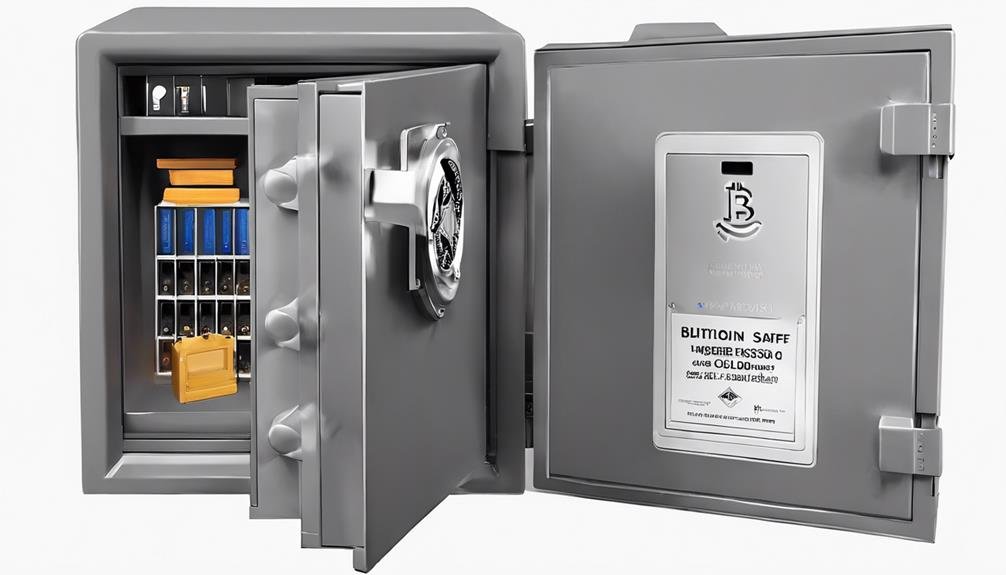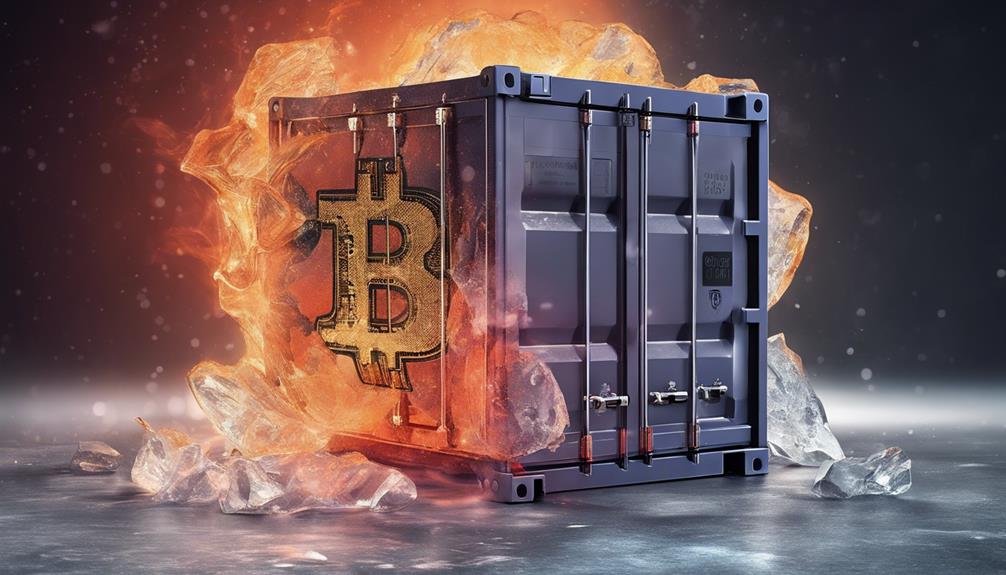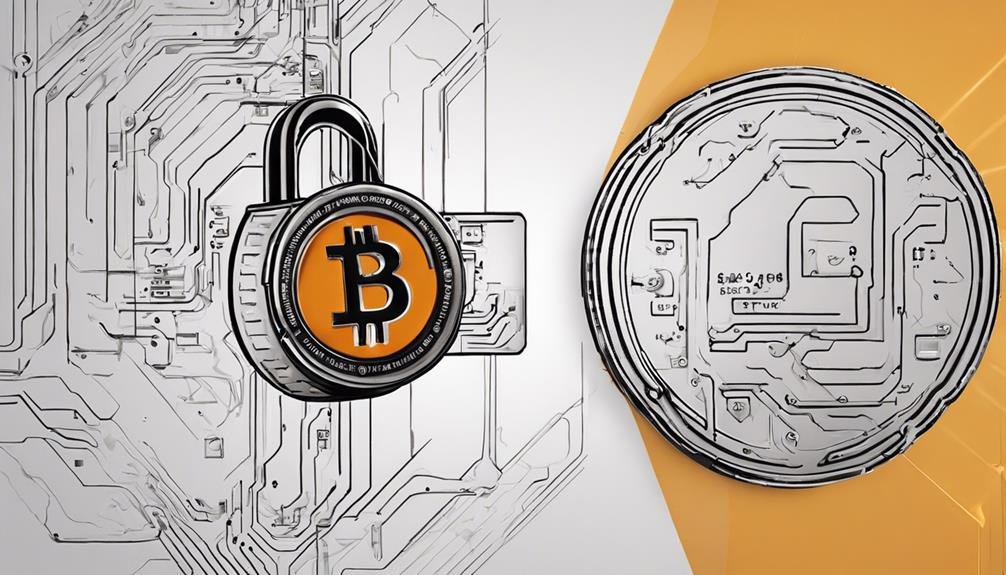When safeguarding your Bitcoin, cold storage acts as a fortress protecting your digital assets. By choosing cold storage, you are taking a vital step towards securing your wealth in the volatile world of cryptocurrencies. The peace of mind of knowing your Bitcoin is shielded from cyber threats is invaluable. But what makes cold storage the go-to option for serious investors? Let’s explore the reasons behind this strategic choice and why it’s becoming increasingly popular among cryptocurrency holders.
Table of Contents
Key Takeaways for Why Choose Cold Storage for Your Bitcoin?
- Cold storage protects Bitcoin from online hacks and theft.
- Hardware wallets offer robust security for offline storage.
- Deep cold storage ensures Bitcoin safety even in case of online compromise.
- Cold storage is recommended for long-term investors seeking enhanced security.
Benefits of Cold Storage for Bitcoin

Utilizing cold storage for your Bitcoin holdings greatly minimizes the vulnerability to online hacks and theft, guaranteeing a secure and long-term investment strategy. Cold storage involves keeping your Bitcoin in an offline wallet, away from internet-connected devices, making it immune to online attacks.
By generating offline Bitcoin addresses for storing your funds, you create a secure environment that greatly reduces the risk of unauthorized access.
When you transfer your Bitcoin to cold storage addresses, you are taking proactive steps to safeguard your assets. This process involves moving your funds from hot wallets (online) to cold wallets (offline), where your private keys are securely stored.
To access your Bitcoin holdings stored in cold storage, you must import your private keys into a secure environment. This ensures that even if your online accounts are compromised, your Bitcoin remains safe in cold storage.
Security Features of Cold Wallets

Cold wallets, a key component of cold storage solutions, provide robust security features to safeguard your Bitcoin holdings from online threats and hacking attempts. When it comes to the security features of cold wallets, there are several aspects to take into account:
- Private Keys Offline: Cold wallets keep private keys offline, ensuring they are not vulnerable to online attacks.
- Hardware Wallets: Hardware wallets, a type of cold storage, offer robust security features such as PIN protection and encryption.
- Deep Cold Storage: Cold storage guarantees that Bitcoin holdings are stored securely in deep cold storage, away from potential cyber threats.
- Secure Storage: Private keys stored in cold wallets are not accessible via the Internet, providing an extra layer of security.
- Enhanced Protection: Most Bitcoin holders prefer cold storage methods due to their enhanced security features, offering peace of mind and protection against unauthorized access.
Cold Storage Vs. Hot Wallets

Comparing Cold Storage to Hot Wallets reveals significant differences in security measures and vulnerability to cyber threats. Cold storage wallets, such as hardware wallets, keep private keys offline, minimizing the risk of online hacking that hot wallets are prone to due to their internet connectivity.
On the other hand, hot wallets are more exposed to potential cyber threats as they are constantly connected to the web. Hardware wallets, a common form of cold storage, offer a physical barrier against online attacks, making them a secure choice for storing cryptocurrency like Bitcoin.
For long-term investors safeguarding their Bitcoin holdings, cold storage is highly recommended. By utilizing offline cryptocurrency storage methods like cold storage wallets, investors can protect their digital assets from unauthorized access and potential theft.
The enhanced security measures provided by cold storage make it a preferred option for individuals looking to secure their cryptocurrency holdings against online vulnerabilities.
How to Set Up Cold Storage for Bitcoin

To establish secure cold storage for your Bitcoin:
- Begin by generating a new Bitcoin address offline.
- Utilize secure tools like hardware wallets to guarantee the safe creation of cold storage addresses.
- Always verify recipient addresses when transferring Bitcoin to cold storage to prevent errors.
- Be mindful of transaction fees that may apply during the transfer process.
- When redeeming Bitcoin from cold storage, import private keys in a secure environment to protect against potential threats.
- Remember that following these steps diligently will help safeguard your assets effectively.
Best Practices for Cold Storage

Consider incorporating multi-signature features into your cold storage strategy to bolster security measures effectively. Utilize hardware wallets like Ledger or Trezor to store Bitcoin private keys offline securely. Implementing multi-signature capabilities adds an extra layer of protection by requiring multiple keys to authorize a transaction.
Create backup copies of your private keys and store them in separate secure locations to prevent data loss. Consider deep cold storage methods such as paper wallets or encrypted sound files for added security. Regularly updating and testing your cold storage setup is critical to guarantee functionality and security against potential vulnerabilities.
These best practices not only enhance the security of your assets but also provide added protection against unauthorized access or cyber threats. By following these guidelines, you can maintain the integrity of your cold storage solution and safeguard your Bitcoin holdings effectively.
Frequently Asked Questions
Should I Put My Bitcoin in Cold Storage?
Storing your Bitcoin in cold storage is essential for security. It reduces risks, especially for long-term storage. Hardware options, backup strategies, and access control enhance offline protection. Key management and recovery processes safeguard your investment and address privacy concerns.
Is It Better to Have a Cold or Hot Wallet for Bitcoin?
For Bitcoin, having a cold wallet like a hardware wallet offers maximum security against cyber threats. Cold wallets are superior to hot wallets in long-term storage, providing offline protection for your keys. Consider your risk assessment.
What Are the Benefits of Cold Storage Crypto?
For enhanced security, long-term storage, and protection from hackers, cold storage crypto offers offline storage, ensuring peace of mind. It reduces the risk of theft, providing safe and secure storage with minimal risk and increased safety.
Why You Should Use a Cold Wallet?
Using a cold wallet for your Bitcoin guarantees enhanced security measures, like offline protection and private key storage. Long-term storage in a cold wallet minimizes risks, providing peace of mind and hack-proof solutions for safe storage.
Conclusion
Now that you’ve learned about the benefits of cold storage for your Bitcoin, it’s time to take action. By safeguarding your cryptocurrency in a cold wallet, you’re building a fortress of protection against online threats. Imagine your Bitcoin as a precious gem, securely locked away in a vault, shielded from potential dangers.
With cold storage, you can rest assured that your investments are safe and sound, allowing you to navigate the volatile crypto landscape confidently.



